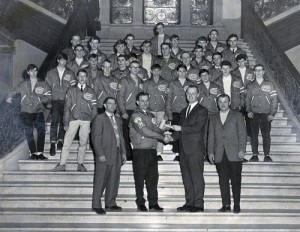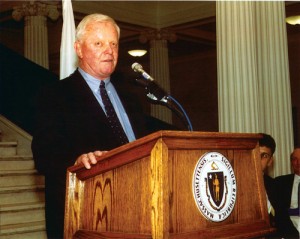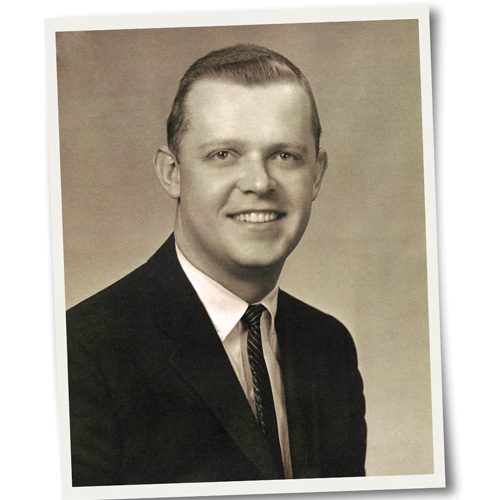Looking back on J. Hilary Rockett’s tireless work and unwavering dedication to the people and future of Salem, Marblehead, and the entire region. By Bryan McGonigle
J. Hilary Rockett served in the Massachusetts state legislature and on the Marblehead Board of Selectmen. He practiced law, helped bring special education reform to the state and the nation, revitalized Pickering Wharf in Salem, and built the Salem Waterfront Hotel. And among many other feats in his full, busy life, he coached Little League. He often told his family, “If you enjoy your work, you’re not working.” Rockett passed away Nov. 26, 2009 at the age 74, after a battle with melanoma. He was surrounded by his family members who are determined to carry on his legacy of hard work and community involvement.
Five generations of Rocketts have lived in Marblehead. J. Hilary was born on January 16, 1935, the son of late Richard H. and Irene Rockett. He graduated from Marblehead High School and Tufts University and served in the Army from 1957 to 1959. His professional career began at Sylvania Lighting, and later in sales with Blue Cross/Blue Shield.
At age 25, J. Hilary became the youngest person to be elected to the Marblehead Board of Selectmen. He served in that capacity from 1960 to 1968. But as rewarding as serving Marblehead was, it wasn’t enough for J. Hilary. In 1962, he ran for a seat in the Massachusetts House of Representatives. He won and served in the legislature until 1972. In addition to his work in local and state politics, he attended Portia Law School (now New England School of Law), graduating in 1967.
J. Hilary’s time in politics was nothing if not productive. As a member of the House Ways and Means Committee, he secured funding for Salem State College’s athletic arena, student union, and nursing program. In Marblehead, he secured financing for many projects including dredging and waterfront improvements for the Village Street, State Street, and Commercial Street piers, as well as grants for Farrell Court and Roads school projects.
While in the legislature, Rockett was the main sponsor of Chapter 766, the Massachusetts Disabilities Act, which gives all young people with special needs the right to educational programs best suited to their abilities. The law, which was especially important to J. Hilary because he was dyslexic, has had a dramatic impact on special needs education in Massachusetts as well as efforts nationwide. Today, millions of students with special needs-from blindness to learning disabilities-are included in their public school communities and given carefully tailored care because of that legislation.
 In 1972, J. Hilary decided to leave the legislature. According to his wife, Denise Rockett, he had actually decided to do so two years prior to that, but then another candidate ran for that seat and J. Hilary didn’t want it to seem like he was running away from a challenge. So he ran again, was reelected, and two years later he left. His law practice-Rockett Law Firm, which he started in 1968-was growing, and with four children, J. Hilary needed to focus on his work so that he could make more money to provide for his growing family, as well as spend more time with them.
In 1972, J. Hilary decided to leave the legislature. According to his wife, Denise Rockett, he had actually decided to do so two years prior to that, but then another candidate ran for that seat and J. Hilary didn’t want it to seem like he was running away from a challenge. So he ran again, was reelected, and two years later he left. His law practice-Rockett Law Firm, which he started in 1968-was growing, and with four children, J. Hilary needed to focus on his work so that he could make more money to provide for his growing family, as well as spend more time with them.
J. Hilary’s tireless efforts have not gone unnoticed on the North Shore. In 1983, the Swampscott Board of Selectmen named him “Honorary Citizen of Swampscott” for his work in transitioning the community from the Metropolitan District Commission. In 1984, Salem State College dedicated its Sports Complex to Rockett’s father, Richard H. Rockett, who was a professor at Salem State College. In 2004, the Massachusetts Legislative Association presented J. Hilary with its Distinguished Service Award for his many years in the legislature and his work on the Ways and Means Committee.
In the late 1960s, J. Hilary developed a passion for real estate and development and took on the renovation of Village Plaza in Marblehead. That project, as well as several others in town, would span almost 30 years and bring new life to neighborhoods around the area. Denise recalls her husband staying up all night drawing plans before he hired an architect. He started his realty business, Rockett Management & Realty Co., and expanded his projects into Salem. In 1996, after J. Hilary considered a few properties in Salem to purchase, the company purchased Pickering Warf. And a couple years later, J. Hilary set his sights on another goal-bringing a hotel to the Salem’s waterfront-and the Salem Waterfront Hotel was born.
“He loved watching things come out of the ground,” Denise says.
Salem Mayor Kimberly Driscoll worked with the Rocketts while she was a city councilor from 2000 to 2003 and has been working with them as mayor since 2006. She remembers J. Hilary Rockett for his ambition and dedication to his work.
“He was definitely passionate about Salem, and the impression I took away from him was that if he wanted to do something, he did it right,” Driscoll says. “It’s always nice to see that in a developer who wants something, knowing that it’s going to be quality.”
In 1962, J. Hilary met a young woman named Denise Hanlon, who worked at the Salem Evening News while he was there placing ads for reelection. Their curiosity about each other soon led to romance. Denise attended banquets and local activities with Selectman Rockett and helped him organize and execute his campaigns. “That was part of our courtship, the campaign trail,” Denise says. They would marry a couple of years later.
Their hectic schedule would continue even as they began having children. There were many days when J. Hilary would work all day on Beacon Hill and drive home to attend Selectmen meetings in Marblehead and then either study for law school, attend classes, or head back to Boston for legislative work. And for a time, he would substitute teach at a junior high school in Lynn for some extra money.
“There were nights when I’d be feeding the babies as close to midnight as I could so they’d sleep late, and he’d be in the dining room studying and underlining text for law school,” Denise says, reminiscing about how busy their lives were in those days. “When you’re young, you don’t think of it. We were no different than anybody else.”
The couple raised four children-Michael, Richard, Pamela, and J. Hilary, Jr. Free time was rare, but money was still tight. While he was in the legislature, the salary was only $5,200 a year, and J. Hilary was paying for law school and starting a family. “We lived on a lot of peanut butter and hamburgers,” Denise says. “But we made it. We survived, and you know what? We had fun.”
J. Hilary instilled his work ethic into to his children from the time they could walk. The three boys had paper routes when they were young, and then they worked for their father. They worked six days a week, rode their bikes to work every day, and if they were late, they were docked an hour’s pay.
“We’ve always worked, from cutting lawns when we were seven years old through now,” Richard says.
Michael recalls one day when he and one of his brothers had just finished their paper route and had to ride their bikes to work at their father’s business. It was pouring out, and as his father drove by he pulled his car over. They asked him for a ride, but J. Hilary refused, saying, “A boss never drives his employees.” Michael pedaled as hard as he could and made it to work five minutes early, but his brother was late. Both were docked an hour’s pay. When Michael asked his father why, he replied, “You guys are a team. He’s late, you’re late. He gets docked, you get docked.”
The Rocketts somehow managed to make time for relaxation as well. J. Hilary enjoyed playing golf, and he and Denise would bring the children on vacations to Long Lake in Naples, Maine. When his son J. Hilary, Jr. tried out for Little League baseball, J. Hilary went to watch him and ended up coaching and managing the team. And when the Rockett boys played hockey, J. Hilary coached hockey even though he couldn’t ice skate.
 “He had a very compassionate side,” Denise says. “He did a lot of work for people without getting paid and without asking for pay. He was always busy, but that’s who he was.”
“He had a very compassionate side,” Denise says. “He did a lot of work for people without getting paid and without asking for pay. He was always busy, but that’s who he was.”
As they grew, the children kept that strong Rockett work ethic and dedication to community. When the company purchased Pickering Wharf, Pamela managed the property and Michael headed the effort to bring a hotel to the waterfront.
The Salem Waterfront Hotel, perhaps the crown jewel of the Rocketts’ Salem properties, has enjoyed a bounty of business even in this slow economy. Now in its fifth year of operation, the hotel is booked throughout peak season from summer through October. The hotel has beaten the Boston hotel market for 18 of the past 20 months.
“It’s a great alternative to Boston,” Michael says. “We had a company today with about 40 people, and they took the coach into Boston and stayed here.”
A big attraction in the hotel is its restaurant, the Regatta, which employs an award-winning chef and has received acclaim by restaurant critics and newspapers. Other selling points are its indoor pool, its tech suite (which has wireless Internet, speakers, a television in the bathroom mirror, and touch power lamps), and the fact that it is the only hotel in the area with a marina.
Plans for expansion of the hotel are underway as well. In the second phase of the plan, the Rocketts will turn an old building adjacent to the marina into a second building for the hotel. The new building will hold function space, technology rooms, a restaurant, and a spa. The two buildings will be connected with a second-floor glassed-in walking bridge.
“Salem is actually a hidden jewel,” Michael says. “Once people come, they’ll always come back. The problem with Salem is you can’t get through it all in a day. You have the museums, the malls, the shops, and everything else.”
Richard has made the marina his masterpiece. When it was being rebuilt, he was there in his wetsuit helping to install the docks. “One thing my father always taught us is you have to be hands-on, and when we built the marina, I definitely wanted to be hands-on,” he says.
The marina is slated for a second phase as well, with plans to consolidate all the various facilities into one building. The marina has about 900 feet of docking, and it is filled throughout the summer and fall. For summer dock rental, there is a three-year waiting list for all boat sizes.
“We’re definitely trying to reclaim our history relative to the waterfront,” Driscoll says. “Having an active waterfront partner with a marina that offers transient docks, that’s a really important component to trying to bring back the economic benefits we have through Salem harbor. It’s a big part of our future. I think their operation of the marina has helped them reclaim that effort.”
The Rockett children have maintained their father’s compassion and commitment to their community as well. Michael coaches football, hockey, and baseball and has taken on several renovation and construction projects at the local fields. The family has built schools in Salem and Marblehead for students with cerebral palsy-a cause dear to the family since J. Hilary Jr.’s son was born with cerebral palsy. Their renovation efforts have extended outside the North Shore recently. J. Hilary Jr. is working on renovation of the Main Street Train Station in Brunswick, Maine, in an effort to improve that city’s downtown and ready the town for a proposed Amtrak Downeaster extension there.
Today, the Rockett family manages its properties together at their Marblehead office. They meet frequently in their upstairs conference room to discuss how things have gone with the company and how they should move forward. They call these meetings “lessons learned.”
One lesson the Rocketts have learned from their patriarch J. Hilary is not to let anything deter them from hard work. He worked in the aftermath of double-knee replacements. Even after he was diagnosed with cancer, he kept working. His family says that he would go to work at their Marblehead office after getting out of a chemo or radiation appointment. He didn’t have his last day at work until early October, when his cancer had progressed to the point of making retirement necessary.
As her husband suffered declining health during his final days, Denise says scores of people stopped by the Rockett house to share prayers and stories of what J. Hilary had done for them. Denise takes comfort in seeing her children work hard to carry on her husband’s legacy.
“I’d like to see what he has established be continued by my children,” she says. “I know they all love the community and love to work. It’s ingrained. It’s part of their genetic makeup.”

